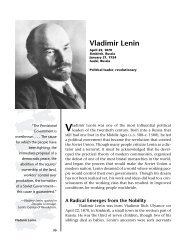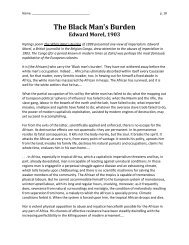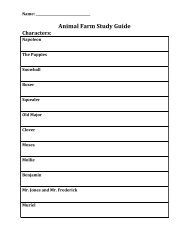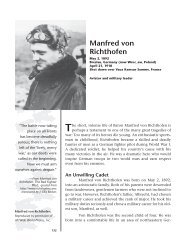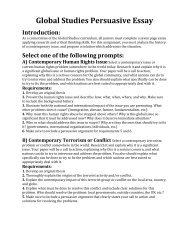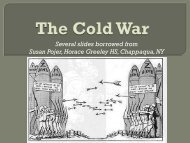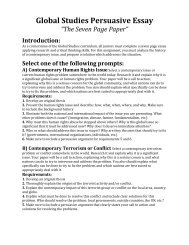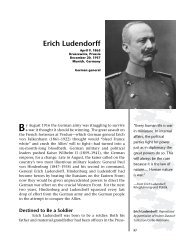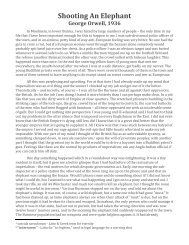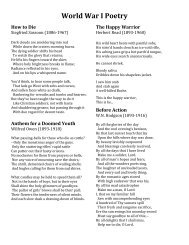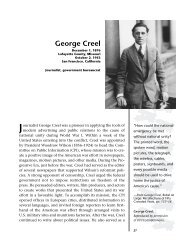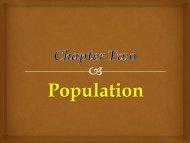Create successful ePaper yourself
Turn your PDF publications into a flip-book with our unique Google optimized e-Paper software.
<strong>Wilfred</strong> <strong>Owen</strong><br />
March 18, 1893<br />
Oswestry, Shropshire, England<br />
November 4, 1918<br />
Sambre Canal, France<br />
Soldier and poet<br />
Some of the most powerful descriptions of war were written<br />
during World War I by the so-called war poets, mostly British<br />
soldiers in their twenties who wrote while fighting in France.<br />
<strong>Wilfred</strong> <strong>Owen</strong> is one of the most important war poets. He wrote<br />
eloquently about his service as an officer during the Battle of the<br />
Somme, which forced him to wrestle with the conflicts he saw<br />
between his duty as a soldier and his deep religious and pacifist<br />
beliefs. (Pacifists object to war as a means of settling disputes.)<br />
<strong>Owen</strong> strongly criticized the tragedy of war in his writings, but<br />
he fulfilled his military duty out of loyalty to his fellow soldiers.<br />
Helping lead his men across a canal in northern France exactly<br />
a week before the end of World War I, <strong>Owen</strong> was killed.<br />
Budding Poet<br />
<strong>Wilfred</strong> Edward Salter <strong>Owen</strong> was born in Oswestry,<br />
Shropshire, England, on March 18, 1893. He was the oldest of<br />
the four children born to Thomas <strong>Owen</strong>, a railroad stationmaster,<br />
and Susan Shaw <strong>Owen</strong>, the daughter of a prosperous<br />
family. <strong>Owen</strong> and his parents lived with his maternal grandfather<br />
until <strong>Wilfred</strong> was four; then his family moved to Birken-<br />
“It is now possible to see<br />
that his gifts were not<br />
only gifts of genius, but<br />
other gifts that only the<br />
gods bestow. . . . He<br />
wrote more eloquently<br />
than other poets of the<br />
tragedy of boys killed in<br />
battle, because he felt<br />
that tragedy more<br />
acutely.”<br />
—From Jon Stallworthy, <strong>Wilfred</strong><br />
<strong>Owen</strong>: A Biography.<br />
<strong>Wilfred</strong> <strong>Owen</strong>. Reproduced by<br />
permission of The Granger<br />
Collection, Ltd.<br />
111
The Poets of World War I<br />
Since ancient times, poets of every<br />
culture have made war and soldiering<br />
important subjects of their work, in epic<br />
poems (long poems) that celebrate heroic<br />
exploits, in lyrics and odes that honor the<br />
courage of the warrior, or in pacifist works<br />
that criticize the brutality and horror of<br />
war. Some of the finest verses in the<br />
history of English literature were written by<br />
poets who served in World War I, many of<br />
whom died in combat while still in their<br />
twenties.<br />
The following men are among the<br />
most prominent of the British war poets:<br />
Rupert Brooke (1887–1915): After<br />
brief noncombat duty in Belgium, he died<br />
of an infection caused by a mosquito bite;<br />
he was serving in the Greek islands at the<br />
time. A sequence of sonnets (poems with<br />
fourteen lines and a definite rhyme pattern)<br />
titled 1914 contains his most famous lines:<br />
“If I should die, think only this of me: /<br />
That there’s some corner of a foreign field /<br />
That is for ever England. . . .” Biographer<br />
Paul Delany calls Brooke “the most famous<br />
British hero of the war.”<br />
Robert Graves (1895–1985):<br />
Though he was severely wounded in<br />
combat in 1916, Graves lived to be ninety.<br />
He served as a captain with the Royal<br />
Welch Fusiliers during World War I and<br />
befriended another member of the<br />
regiment, poet Siegfried Sassoon. Graves’s<br />
collection of war poems, Fairies and<br />
Fusiliers, helped establish his reputation as<br />
a literary figure after the war. The novel I,<br />
Claudius (1934) and the mythological<br />
study The White Goddess (1948) are his<br />
bestknown works. One of his sons was<br />
killed in World War II.<br />
Isaac Rosenberg (1890–1918):<br />
The son of Russian Lithuanian immigrants<br />
to England, Rosenberg enlisted in the<br />
British army in 1915, and because he was<br />
rather short, he was assigned to the<br />
Bantam Battalion, a regiment made up of<br />
volunteers who were below the regulation<br />
minimum height of 5 feet 2 inches. In the<br />
head, near Liverpool. <strong>Owen</strong> attended Birkenhead Institute<br />
until he was fourteen, when the family moved back to Shropshire,<br />
settling in the county seat at Shrewsbury. There, he<br />
attended Shrewsbury Technical School but failed in his efforts<br />
to win a scholarship to the University of London. He felt<br />
inclined toward religious work and accepted a position in<br />
which he received room and board in exchange for work with<br />
the vicar (a minister in charge of a church) of Dunsden in<br />
112 World War I: Biographies
last two years of his brief life, Rosenberg<br />
wrote several important versedramas<br />
about Old Testament subjects, including<br />
Moses and The Unicorn (about King Saul<br />
and his wife). Two important poems that<br />
he wrote while in military service are titled<br />
“Marching” and “Break of Day in the<br />
Trenches.” Critics regard Rosenberg’s<br />
“Dead Man’s Dump” (1917) as his finest<br />
“war” poem. Rosenberg was shot to death<br />
while on patrol duty during the Battle of<br />
the Somme on April 1, 1918.<br />
Siegfried Sassoon (1886–1967):<br />
One of the poets who survived long after<br />
World War I, Sassoon befriended and<br />
encouraged such poets as Rupert Brooke,<br />
Robert Graves, and <strong>Wilfred</strong> <strong>Owen</strong>.<br />
Although he enlisted in the army and<br />
received awards for heroism, Sassoon<br />
became a pacifist and wrote an antiwar<br />
letter, “A Soldier’s Declaration,” that led<br />
some politicians to call for his courtmartial.<br />
With Robert Graves’s help, Sassoon was<br />
committed to a mental hospital instead,<br />
but he decided to return to combat so as<br />
not to betray his fellow soldiers. In 1919<br />
The War Poems of Siegfried Sassoon was<br />
published. The final poem celebrates the<br />
armistice of 1918 in these words: “. . .O,<br />
but Everyone / Was a bird; and the song<br />
was wordless; the singing will never be<br />
done.”<br />
Edward Thomas (1878–1917):<br />
Killed on Easter Sunday, 1917, during the<br />
Battle of Arras, the thirty-nine-year-old<br />
Thomas was older than most of the other<br />
World War I poets, and he had already<br />
established his literary career before the<br />
war. He was strongly influenced by the<br />
American poet Robert Frost (1874–1963).<br />
“Rain,” one of Thomas’s most important<br />
“war” poems, written in 1916, includes<br />
these lines: “Rain, midnight rain, and<br />
nothing but wild rain / On this bleak hut,<br />
and solitude, and me / Remembering<br />
again that I shall die. . .” His wife, Helen<br />
Thomas, also was a noted poet.<br />
Oxford. He left this position partly for health reasons and<br />
partly because he came to believe that the established church<br />
was failing in its duty to the poor. He returned to his family’s<br />
home briefly, then accepted a position teaching at the Berlitz<br />
School of Languages in Bordeaux, France. During this period,<br />
<strong>Owen</strong> started writing poetry. He admired the writings of the<br />
Romantic poets, like John Keats, and he became friends with<br />
the poet Laurent Tailhade, who was a fellow pacifist.<br />
<strong>Wilfred</strong> <strong>Owen</strong> 113
A sign in wartime France<br />
warning that antigas<br />
precautions should be taken<br />
when passing beyond this<br />
point. <strong>Wilfred</strong> <strong>Owen</strong>’s most<br />
famous poem, “Dulce et<br />
Decorum Est,” was inspired<br />
by his disgust at the use of<br />
poisonous gas. Reproduced by<br />
permission of Hulton<br />
Getty/Archive Photos, Inc.<br />
After World War I broke out, <strong>Owen</strong> returned to England<br />
and enlisted in the Artist’s Rifles, a special air service regiment.<br />
Commissioned a lieutenant in 1916, he was sent to<br />
fight in France with the Lancashire Fusiliers. It was while he<br />
was serving that he began to write his finest poetry, which<br />
described in graphic detail the agonies of his fellow soldiers.<br />
His most famous poem, “Dulce et Decorum Est,” was inspired<br />
by <strong>Owen</strong>’s disgust at the use of mustard gas (a poisonous gas<br />
that has irritating effects to the body) against his fellow soldiers;<br />
the poem’s ironic title is part of a Latin motto that means<br />
“Sweet and fitting it is to die for one’s country.” In <strong>Owen</strong>’s<br />
judgment, no one who had experienced the horrors of battle<br />
would proclaim such patriotic sentiments. In this excerpt from<br />
the poem, <strong>Owen</strong> addresses those who believe in the glory and<br />
heroism of war: “If in some smothering dreams you too could<br />
pace / Behind the wagon that we flung him in / My friend, you<br />
would not tell with such high zest / To children ardent for<br />
some desperate glory, / The old lie: Dulce et decorum est / Pro<br />
patria mori [Sweet and fitting it is to die for one’s country].”<br />
114 World War I: Biographies
Learning from Other Poets<br />
As his time in the service dragged on, <strong>Owen</strong> became<br />
increasingly bitter about the harsh and brutal conditions of the<br />
battlefield. In letters to his mother and in poems, he expressed<br />
a deep pessimism about the war, and he began to criticize the<br />
political leaders who were, in his mind, responsible for the carnage<br />
(killing). In June 1917, suffering from shell shock (a nervous<br />
breakdown due to combat conditions), <strong>Owen</strong> was admitted<br />
to Craiglockhart War Hospital for Nervous Disorders near<br />
Edinburgh, Scotland. He became editor of the hospital’s magazine,<br />
The Hydra, in which he published some of his poems as<br />
well as those of Siegfried Sassoon (1886–1967), another British<br />
soldier at the hospital, who went on to become a well-known<br />
poet. <strong>Owen</strong> also taught at a local school and played in an amateur<br />
orchestra. This helped him recover from his nervous disorder,<br />
and he began to write some of his best poetry.<br />
Through Sassoon’s influence, <strong>Owen</strong> met many of the<br />
other prominent poets of the time. Among the literary figures<br />
who became his friends and mentors were Robert Graves<br />
(1895–1985), Robert Ross (1869–1918), and Charles Scott-<br />
Moncrieff (1889–1930). <strong>Owen</strong> felt that his association with<br />
these men gave him the tools he needed to succeed as a poet.<br />
He wrote a letter to his mother, quoted in the Norton Anthology<br />
of English Literature, in which he compared himself to a<br />
ship able to sail on its own, without the assistance of tugboats:<br />
“I am a poet’s poet. I am started. The tugs have left me. I feel<br />
a great swelling of the opening sea taking my galleon [large<br />
sailing ship].”<br />
Return to the Battlefield<br />
Despite his pacifist inclinations, <strong>Owen</strong> resolved to go<br />
back to the battlefield out of loyalty to his comrades and in<br />
order to write more authentically about the experiences of battle.<br />
On December 31, 1917, he wrote in his journal (quoted in<br />
the Norton Anthology of English Literature) about the terror he<br />
had once seen in his comrades’ faces: “It will never be painted,<br />
and no actor will ever seize it. And to describe it, I think I must<br />
go back and be with them.”<br />
By August 1918, <strong>Owen</strong> had recovered from his illness<br />
well enough to return to France. He won a Military Cross for<br />
<strong>Wilfred</strong> <strong>Owen</strong> 115
<strong>Wilfred</strong> <strong>Owen</strong>’s poems<br />
described the deplorable<br />
conditions that soldiers had<br />
to face on the battlefield,<br />
like this American soldier<br />
standing guard during a<br />
German gas attack in<br />
France. Reproduced by<br />
permission of Hulton<br />
Getty/Archive Photos, Inc.<br />
bravery when he helped lead his company to safety during a<br />
battle. On November 4, while leading a group of soldiers across<br />
the Sambre Canal, <strong>Owen</strong> was killed in a hail of machinegun<br />
fire. He died four months short of his twenty-sixth birthday—<br />
and exactly one week before the armistice (peace treaty) of<br />
November 11 brought World War I to an end. . A few months<br />
before his death, <strong>Owen</strong> had written a preface for an edition of<br />
his poetry that he hoped to have published. In 1985, an<br />
excerpt from this preface—”My subject is War, and the pity of<br />
War. The poetry is in the pity. . .”—was carved into a monument<br />
that memorializes sixteen World War I poets in the Poets’<br />
Corner of Westminster Abbey in London.<br />
Siegfried Sassoon knew the quality of <strong>Owen</strong>’s verses<br />
and arranged to have twenty-three of <strong>Owen</strong>’s poems published.<br />
The collection, titled Poems, appeared in 1920; it was<br />
edited by Edith Sitwell, a member of a prominent literary family<br />
in England. Her brother, Osbert Sitwell, had been a friend<br />
of <strong>Owen</strong> and Sassoon. In 1931, an expanded edition with<br />
116 World War I: Biographies
twenty-nine poems was published, together with an introduction<br />
by Edmund Blunden, another notable British poet who<br />
had served in World War I. <strong>Owen</strong>’s work has continued to<br />
inspire later generations of poets, such as Cecil DayLewis who<br />
in 1964 edited The Collected Poems of <strong>Wilfred</strong> <strong>Owen</strong>, which<br />
included seventy-nine poems.<br />
For More Information<br />
Books<br />
Abrams, M.H., et al, editors. Norton Anthology of English Literature. Volume<br />
2; 7th edition. New York: Norton, 2000.<br />
Delany, Paul. Rupert Brooke and the Ordeal of Youth. New York: Free Press,<br />
1987.<br />
<strong>Owen</strong>, <strong>Wilfred</strong>. Collected Letters. London and New York: Oxford University<br />
Press, 1967.<br />
<strong>Owen</strong>, <strong>Wilfred</strong>. War Poems and Others. London: Chatto and Windus, 1973.<br />
Stallworthy, Jon. <strong>Wilfred</strong> <strong>Owen</strong>: A Biography. Oxford: Oxford University<br />
Press, 1975.<br />
Sound Recordings<br />
Britten, Benjamin. War Requiem (op. 66), 1962; recorded by Deutsche<br />
Grammophon, Hamburg, 1993.<br />
Films<br />
War Requiem. Directed by Derek Jerman. Mystic Fire Video, 1988. Videocassette.<br />
Web sites<br />
“The Poems of <strong>Wilfred</strong> <strong>Owen</strong>.” [Online] http://www.pitt.edu/~novosel/<br />
owen.html (accessed April 2001).<br />
“The War Poets Collection.” [Online] http://www.napier.ac.uk/depts/<br />
library/craigcon/warpoets/warphome.htm (accessed April 2001).<br />
“The <strong>Wilfred</strong> <strong>Owen</strong> Association.” [Online] http://www.191418.co.uk/<br />
owen (accessed April 2001).<br />
“WOMDA: The <strong>Wilfred</strong> <strong>Owen</strong> Multimedia Digital Archive.” [Online]<br />
http://www.hcu.ox.ac.uk/jtap/ (accessed April 2001).<br />
<strong>Wilfred</strong> <strong>Owen</strong> 117



